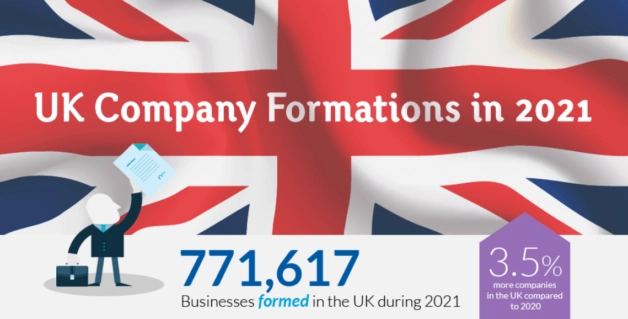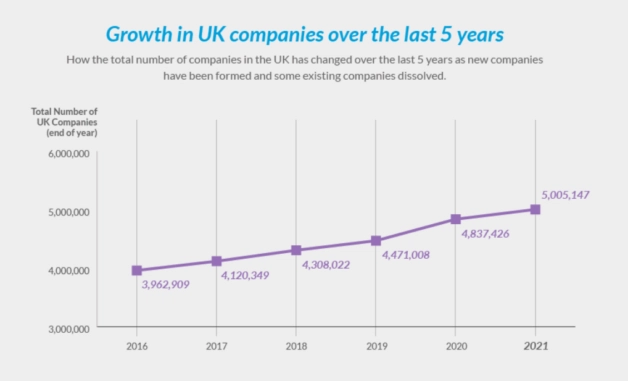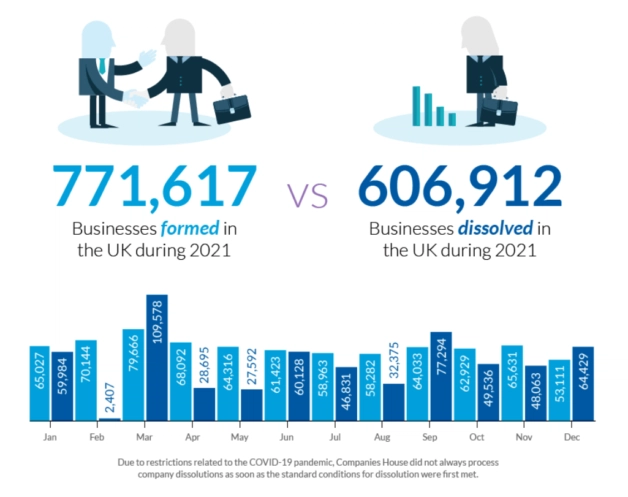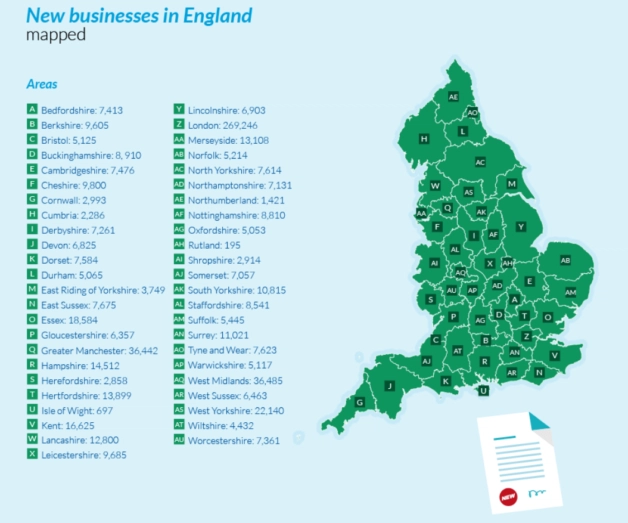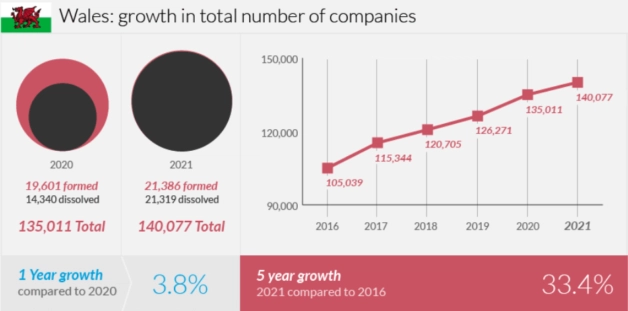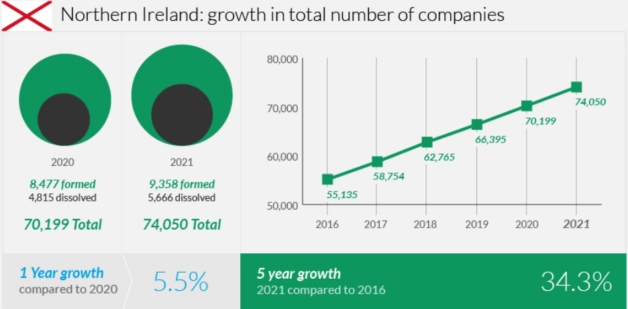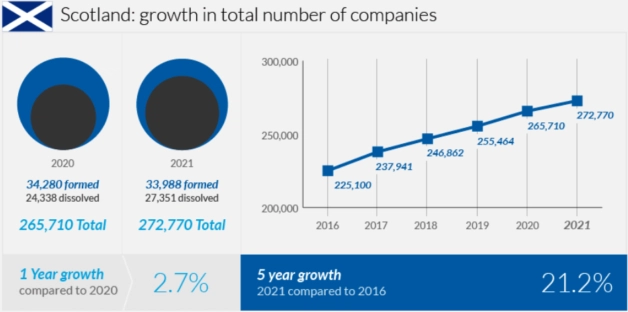We’re delighted to release the Inform Direct 2022 Review of UK Company Formations.
Our study represents the most comprehensive study of UK company formations and dissolutions, created using data from Companies House and the Office of National Statistics.
Alongside a UK summary, we examine the data for each of the constituent nations of the UK and individual counties, giving you the tools to track regional business performance from Devon to Dundee.
It’s also easy to drill down further and examine the statistics for specific districts and even individual wards. You can also compare for figures for 2021 with those of previous years to identify trends over time.
In this article, we explore what the data tell us about the performance of UK business in post-Brexit and hopefully-almost-post-pandemic Britain.
A better way to form a new UK company
Inform Direct is the perfect tool to make forming a new UK company a whole lot easier:
> Easy, intuitive online process
> Great choice of packages and extras
> Excellent value for money
> Compliant documents, registers supplied
> Backed by dedicated, expert support
A new record for UK companies
There were 771,617 companies formed in the UK in 2021, only a fraction short of the record 780,766 formations in 2020. To see so many new companies is a positive signal about the health of the UK economy, with the number of company formations often used as a proxy for business confidence.
It is also encouraging to see some evidence that the number of new companies formed in 2020 wasn’t an aberration, but perhaps a ‘new normal’. While it’s clear there were some companies set up in 2020 purely to take advantage of government help during the pandemic – apparently including some with fraudulent intent – the high numbers again in 2021, when schemes were being withdrawn, suggest the vast majority are genuine companies with a commercial purpose.
The highest number of new companies was once again in wholesale and retail trade (133,077), continuing a trend of new businesses being set up to sell goods and services locally or online, matching changes in customer demand. 2021 also saw particular activity in the construction (77,667 new companies) and property (73,668 new companies) sectors.
There are also now more UK companies in existence than ever before, breaching the 5,000,000 milestone for the first time in history. The 5,005,147 total is up 3.5% in a year and 26.3% over five years, part of a trend that has continued consistently for more than 10 years.
An unwelcome record – company dissolutions
In less positive news, 2021 also saw a record number of UK companies dissolved, with 606,912 companies officially ending their lives in the year. That figure is almost 50% up on the 418,427 dissolutions recorded during 2020.
There are several possible contributing factors to the high level of companies closing:
- Continued changes in expenditure patterns as a result of the pandemic, affecting some industries disproportionately. In many areas, we see an ongoing trend towards online sales, and those companies not able or willing to make that transition may face a challenging future.
- As government financial backing has been progressively withdrawn, those businesses that were only kept alive via such support are likely to close. The fact that we saw quite so few dissolutions in 2020 – a five year low despite the ravages of the pandemic – suggests many companies were effectively on artificial life support and would always struggle once the Treasury’s safety net was removed.
- Many business owners have seemingly taken the opportunity to ‘call it a day’. This is similar to the trend in employment, with many choosing not to re-join the workforce even as a surplus of jobs have become available.
- Among those who formed a new business while furloughed from an employed role, many will now have returned to their main employment.
- In a few cases, there is evidence that companies were only formed in 2020 to fraudulently claim funding, and those entities are likely since to have been dissolved.
A varied regional picture
England led the UK in raw company numbers with 269,246 new companies formed, as would be expected – and was ahead of the rest of the UK even when adjusted for population, with 12.9 new companies for every 1,000 people. There were 3.5% more companies in England at the end of 2021 than a year ago.
As we see each year, London overshadowed the rest of the country in company formation activity, even when the figures are adjusted for population. Of the 684,335 companies formed in England, 269,246 – more than a third – were started in London. Many companies, even those that do most of their business elsewhere in the UK, still choose to utilise a registered office address in the capital.
Outside of London, the strongest performances were in the West Midlands (36,485 new companies formed), Greater Manchester (36,442), West Yorkshire (22,140) and Essex (18,584). Eleven English counties saw a record number of companies formed – both comparatively populous areas such as Greater Manchester and Lancashire, and more rural counties such as Norfolk and Suffolk. Conversely, three counties – Cheshire, Rutland and Worcestershire – had fewer companies at the end of 2021 than a year earlier, with dissolutions outpacing company formations.
While Wales achieved a record number of company formations (21,386), it also saw a record total of companies dissolved (21,319). Therefore, the 3.8% annual growth in businesses based in Wales was largely a result of companies moving their registered office address from England into Wales. It did, however, mean that the number of companies based in Wales reached an all-time high of 140,077.
Northern Ireland boasted a record 9,358 new company formations, with 2,302 of these companies formed in Belfast. With 5.5% annual growth in company numbers, Northern Ireland easily outperformed the rest of the UK. Its five-year growth in companies was also the highest in the UK – 34.3% compared to the UK average of 26.3% – demonstrating a consistent year-on-year growth in the business population. When the figures are adjusted for population, however, Northern Ireland lags behind the rest of the UK – 5.2 new companies per 1,000 people compared to the UK average of 12.2.
Scotland again saw the weakest percentage growth in company numbers, with the 2021 increase of 2.7% and five-year increase of 21.2% both the lowest of all the nations of the UK. The 33,988 companies formed across Scotland was a lower figure than in Greater Manchester, although the total number of companies in Scotland did reach a new record high of 272,770. Edinburgh is home to the highest number of companies (55,938), although it was once again outperformed by Glasgow in new company formations.
What’s the outlook for 2022?
2022 should be the year we see a return to some semblance of normality, with the opportunity to judge what the ‘new normal’ looks like and the resulting impact on the direction of the UK economy.
In theory, there is reason to be optimistic. Assuming the worst effects of the pandemic continue to abate, we should see further business opportunities – particularly in entertainment, travel and other industries most constrained over the last 24 months.
Similarly, there is much talk of ‘Brexit opportunities’ as the economy continues to adapt following the UK’s exit from the European Union. It is argued that, to the extent that de-regulation is possible in some sectors of the economy, it can free entrepreneurs to be able to pursue new business opportunities.
Against that, many will be concerned by the prospect of continued high inflation and rising interest rates, as businesses struggle both to contain their costs and find it harder to borrow for investment. Having experienced a backdrop of benign inflation and interest rates over the last 10 years, this will also be a wholly new challenge for many business owners. Well over half of current UK companies have started life within that period.
Over 1.5 million companies have been formed in the last two years alone, so there will be many first-time company directors who need to keep abreast of their statutory responsibilities. Each year we see many young companies struck off by Companies House because they haven’t filed the annual confirmation statement or their first set of accounts. It’s prudent for new directors to seek out information and good advice at an early stage, starting with the appointment of a good accountant, who can take on the role of a trusted adviser – thereby helping to facilitate growth – alongside supporting the company with its statutory compliance responsibilities.
Inform Direct makes it quick and easy to maintain statutory registers, manage company records and submit filings to Companies House at the touch of a button.


